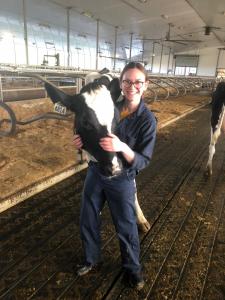 |
Olivia WilloughbyPosition/Title: MSc by Thesis email: owilloug@uoguelph.ca Phone: 289-685-5903 Office: ANNU 045
|
I am currently an MSc student under the supervision of Dr. Angela Cánovas in the Centre for Genetic Improvement of Livestock (CGIL). I completed my Bachelor of Science in Animal Biology in 2021, during which I worked and volunteered as a research student with Dr. Cánovas on projects studying the genetics of the immune response of sheep and dairy cows. I also help with a trial happening at the Ontario Veterinary College with Dr. Rita Couto Serrenho and Dr. Stephen LeBlanc, studying how ionized calcium levels affect the health of post-partum dairy cows. In 2020, I had the opportunity to work on an OMAFRA-USEL project with Dr. Renée Bergeron, studying the welfare of dairy cows in composting bedded pack (CBP) barns, and best management practices for these novel housing systems. As you can see, my interests are wide-ranging, and I am driven by my desire to learn and to contribute to the improvement of Canadian livestock production.
My current master’s project is focused on understanding the genetic mechanisms regulating the host immune response of sheep to the parasite Haemonchus contortus, a pathogenic nematode affecting grazing sheep in Ontario that can cause production losses and poor animal welfare in affected animals. This pathogen is of major concern as there is an increasing threat of anthelmintic resistance, that is, a reduction in the efficacy of the drugs used to treat and control H. contortus infection. This problem is compounded by the effects of climate change, specifically hotter and wetter weather during the summer, which may lengthen the breeding season of these parasites and further increase the environmental challenge faced by grazing sheep. A potential strategy to combat this problem is to increase the level of parasite resistance in the sheep themselves, reducing or eliminating the need for antiparasitic intervention. Some tropical breeds of sheep appear to have naturally evolved resistance to gastrointestinal nematodes, and this trait appears to be moderately heritable. My project will use novel -OMICS technologies, such as transcriptomics, to understand the underlying biological mechanisms/systems that confer parasite resistance in sheep as well as their genetic regulation in order to develop robust methods for genetic selection of resistant animals. Additionally, this project aims to understand how climate differences in Ontario affects the prevalence and infection rate of internal parasites in grazing sheep.
Outside of school, I enjoy running, riding my horse Buttons, and spending time with my friends and family. I am also trying to learn Portuguese in my spare time.


